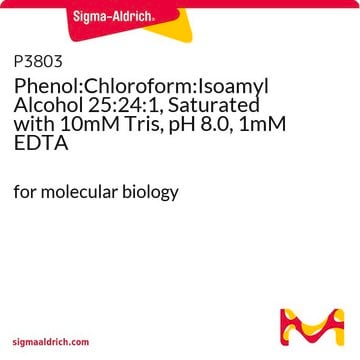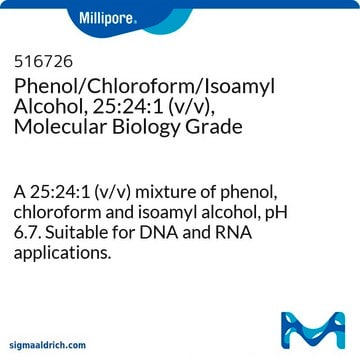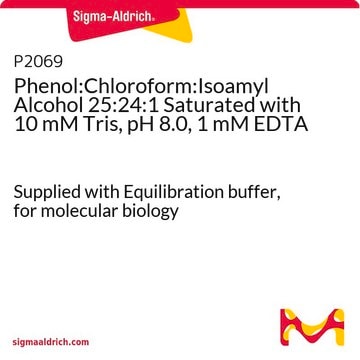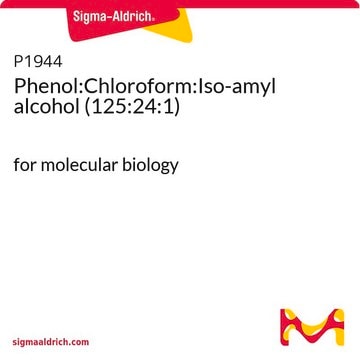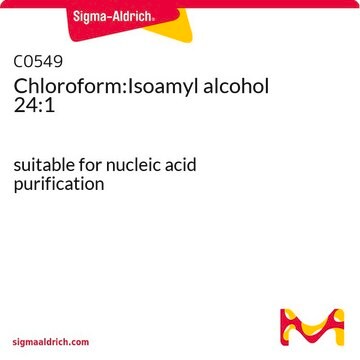77618
Phenol – chloroform – isoamyl alcohol mixture
BioUltra, for molecular biology, 49.5:49.5:1
Synonym(s):
phenol:Chloroform:Isoamyl Alcohol
About This Item
Recommended Products
grade
for molecular biology
Quality Level
product line
BioUltra
form
liquid
impurities
DNases, none detected
RNases, none detected
phosphatases, none detected
proteases, none detected
pH
7.7-8.3(H2O-phase, after extraction with H2O, 1:1)
density
1.29 g/mL at 20 °C
absorption
cut-off at 360 nm
storage temp.
2-8°C
SMILES string
ClC(Cl)Cl.CC(C)CCO.Oc1ccccc1
InChI
1S/C6H6O.C5H12O.CHCl3/c7-6-4-2-1-3-5-6;1-5(2)3-4-6;2-1(3)4/h1-5,7H;5-6H,3-4H2,1-2H3;1H
InChI key
ZYWFEOZQIUMEGL-UHFFFAOYSA-N
Looking for similar products? Visit Product Comparison Guide
Application
- Simultaneous quantification of multiple RNA cargos co-loaded into nanoparticle-based delivery systems.: This study highlights the use of a phenol-chloroform-isoamyl alcohol mixture for the extraction and quantification of RNA cargos from nanoparticles, facilitating accurate delivery system analysis (Lokras et al., 2022).
- Analysis of Circulating microRNAs and Their Post-Transcriptional Modifications in Cancer Serum by On-Line Solid-Phase Extraction-Capillary Electrophoresis-Mass Spectrometry.: This research utilized the phenol-chloroform-isoamyl alcohol mixture to extract microRNAs from serum samples, providing insights into cancer biomarkers (Pero-Gascon et al., 2018).
- The application of alkaline lysis and pressure cycling technology in the differential extraction of DNA from sperm and epithelial cells recovered from cotton swabs.: The study demonstrates the effectiveness of using phenol-chloroform-isoamyl alcohol for DNA extraction in forensic applications, improving the analysis of mixed samples (Nori and McCord, 2015).
- The critical role of DNA extraction for detection of mycobacteria in tissues.: This article emphasizes the necessity of phenol-chloroform-isoamyl alcohol extraction in accurately detecting mycobacterial DNA in tissue samples, enhancing diagnostic precision (Radomski et al., 2013).
Physical form
Other Notes
Signal Word
Danger
Hazard Statements
Precautionary Statements
Hazard Classifications
Acute Tox. 3 Oral - Acute Tox. 4 Dermal - Acute Tox. 4 Inhalation - Aquatic Chronic 2 - Carc. 2 - Eye Dam. 1 - Muta. 2 - Repr. 2 - Skin Corr. 1B - STOT RE 1 Oral - STOT RE 2 - STOT SE 3
Target Organs
Central nervous system, Liver,Kidney, Nervous system,Kidney,Liver,Skin
Storage Class Code
6.1A - Combustible acute toxic Cat. 1 and 2 / very toxic hazardous materials
WGK
WGK 3
Flash Point(F)
177.8 °F - closed cup
Flash Point(C)
81 °C - closed cup
Personal Protective Equipment
Certificates of Analysis (COA)
Search for Certificates of Analysis (COA) by entering the products Lot/Batch Number. Lot and Batch Numbers can be found on a product’s label following the words ‘Lot’ or ‘Batch’.
Already Own This Product?
Find documentation for the products that you have recently purchased in the Document Library.
Customers Also Viewed
Related Content
Professor Ron Raines works with Sigma-Aldrich on the development of reagents and tools for chemical biology such as the traceless Staudinger ligation reagent (670359). DTBA (774405), a superior biological reducing reagent to DTT, is another technology to come out of the Raines lab.
Professor Ron Raines works with Sigma-Aldrich on the development of reagents and tools for chemical biology such as the traceless Staudinger ligation reagent (670359). DTBA (774405), a superior biological reducing reagent to DTT, is another technology to come out of the Raines lab.
Professor Ron Raines works with Sigma-Aldrich on the development of reagents and tools for chemical biology such as the traceless Staudinger ligation reagent (670359). DTBA (774405), a superior biological reducing reagent to DTT, is another technology to come out of the Raines lab.
Professor Ron Raines works with Sigma-Aldrich on the development of reagents and tools for chemical biology such as the traceless Staudinger ligation reagent (670359). DTBA (774405), a superior biological reducing reagent to DTT, is another technology to come out of the Raines lab.
Our team of scientists has experience in all areas of research including Life Science, Material Science, Chemical Synthesis, Chromatography, Analytical and many others.
Contact Technical Service
